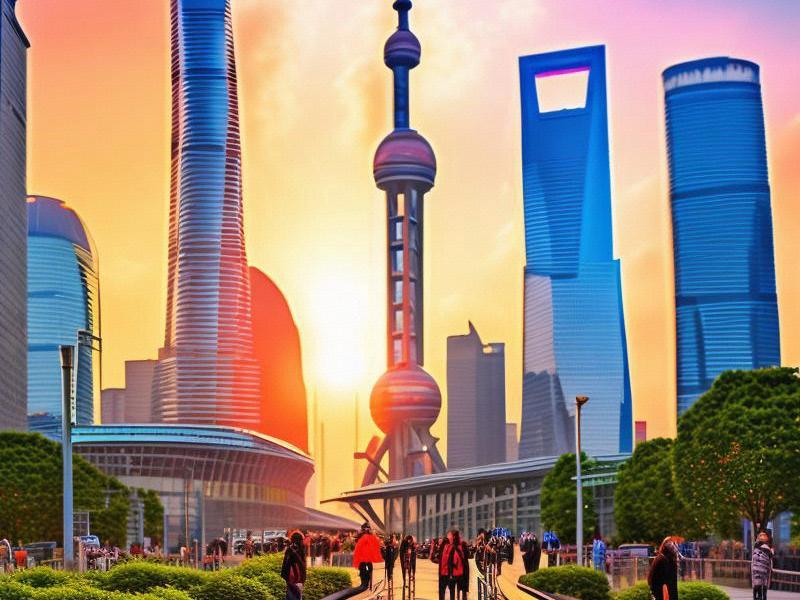This article delves into the remarkable transformation of Shanghai into a global innovation hub, exploring its economic strategies, technological advancements, and urban development initiatives that have positioned it as a leader in innovation.

Shanghai, the bustling metropolis on the banks of the Huangpu River, has long been a symbol of China's economic prowess. In recent years, however, it has also emerged as a global innovation hub, attracting the attention of the world for its rapid technological advancements, dynamic business environment, and forward-thinking urban development strategies.
The city's journey towards becoming a global innovation hub is not a recent phenomenon. It has been a gradual process, fueled by a combination of government policies, private sector initiatives, and a culture of innovation. Shanghai's strategic location at the mouth of the Yangtze River, its well-developed infrastructure, and its status as a major financial center have provided a solid foundation for this transformation.
One of the key factors behind Shanghai's rise as an innovation hub is its robust economic strategy. The city has embraced globalization and open markets, attracting foreign investment and fostering domestic entrepreneurship. The Shanghai Free Trade Zone (FTZ), established in 2013, has been a game-changer, offering a more business-friendly environment with streamlined regulations and reduced tariffs. This has encouraged multinational corporations to set up regional headquarters in Shanghai, bringing with them advanced technologies and innovative practices.
The FTZ has also served as a testing ground for China's broader economic reforms. It has piloted various initiatives, such as the expansion of the negative list for foreign investment, the simplification of customs procedures, and the promotion of cross-border e-commerce. These measures have not only enhanced the business environment but also facilitated the flow of goods, services, and capital, further boosting Shanghai's competitiveness.
阿拉爱上海
In addition to economic strategies, Shanghai's technological advancements have played a pivotal role in its transformation. The city has invested heavily in research and development (R&D), establishing itself as a leading center for science and technology. The Zhangjiang Hi-Tech Park, often referred to as "China's Silicon Valley," is a testament to this commitment. Home to numerous high-tech enterprises, research institutions, and universities, the park has become a breeding ground for innovation.
Shanghai's focus on emerging technologies such as artificial intelligence (AI), big data, and biotechnology has further solidified its position as a global innovation hub. The city has established specialized zones and incubators to support the growth of these industries. For instance, the Shanghai AI Park, launched in 2018, aims to crteeaa comprehensive ecosystem for AI development, including R&D centers, testing facilities, and application demonstration zones. Similarly, the Shanghai International Biotech Center is designed to attract top-tier biotech companies and researchers, fostering collaboration and innovation in the field.
The city's universities and research institutions have also contributed significantly to its technological advancements. Institutions such as Fudan University, Tongji University, and the Shanghai Jiao Tong University have strong research programs in cutting-edge fields. They collaborate with industry partners to translate academic研究成果(成果)(achievements)(将“成果”翻译为“achievements”) into practical applications, driving innovation and economic growth.
上海龙凤419社区
Urban development has been another critical aspect of Shanghai's transformation into a global innovation hub. The city has implemented innovative urban planning strategies to crteeaa livable and sustainable environment for its residents and businesses. The Bund and Pudong areas are prime examples of this transformation. Once industrial zones, these areas have been redeveloped into modern financial and commercial centers, symbolizing Shanghai's economic progress.
Shanghai's commitment to sustainability is evident in its efforts to reduce carbon emissions and promote green technologies. The city has set ambitious targets to become a carbon-neutral city by 2050. It has invested in renewable energy, improved public transportation systems, and implemented waste management programs. The development of the Zhangjiang Comprehensive Energy Demonstration Zone is a significant step towards achieving these goals. The zone integrates various forms of renewable energy, such as solar and wind power, with advanced energy storage technologies, showcasing Shanghai's leadership in sustainable urban development.
The city's cultural and creative industries have also flourished, contributing to its innovative ecosystem. Shanghai has embraced its rich cultural heritage while fostering a vibrant creative scene. The city hosts numerous art exhibitions, music festivals, and film festivals, attracting artists and creatives from around the world. The development of cultural and creative industries has not only enriched the city's cultural landscape but also provided new opportunities for innovation and entrepreneurship.
爱上海
Shanghai's rise as a global innovation hub has had a profound impact on its economy and society. The city has created numerous job opportunities, attracted top talent, and enhanced its global competitiveness. It has also contributed to China's broader economic transformation, serving as a model for other cities aspiring to become innovation hubs.
However, challenges remain on the path to sustainable growth. Shanghai must address issues such as income inequality, environmental sustainability, and the need for continuous innovation. The city is actively working on these fronts, implementing policies to promote inclusive growth, reduce environmental impact, and foster a culture of lifelong learning.
In conclusion, Shanghai's journey towards becoming a global innovation hub is a testament to its resilience, adaptability, and vision. Through strategic economic policies, technological advancements, and innovative urban development, the city has positioned itself as a leader in innovation. As it continues to evolve, Shanghai's story serves as an inspiration for other cities around the world, demonstrating the potential of innovation to drive economic growth and improve quality of life.
Looking ahead, Shanghai's future as a global innovation hub looks promising. The city is poised to leverage emerging technologies, strengthen its international partnerships, and enhance its urban sustainability. With its dynamic business environment, vibrant cultural scene, and commitment to innovation, Shanghai is well on its way to becoming a beacon of progress and prosperity in the 21st century.